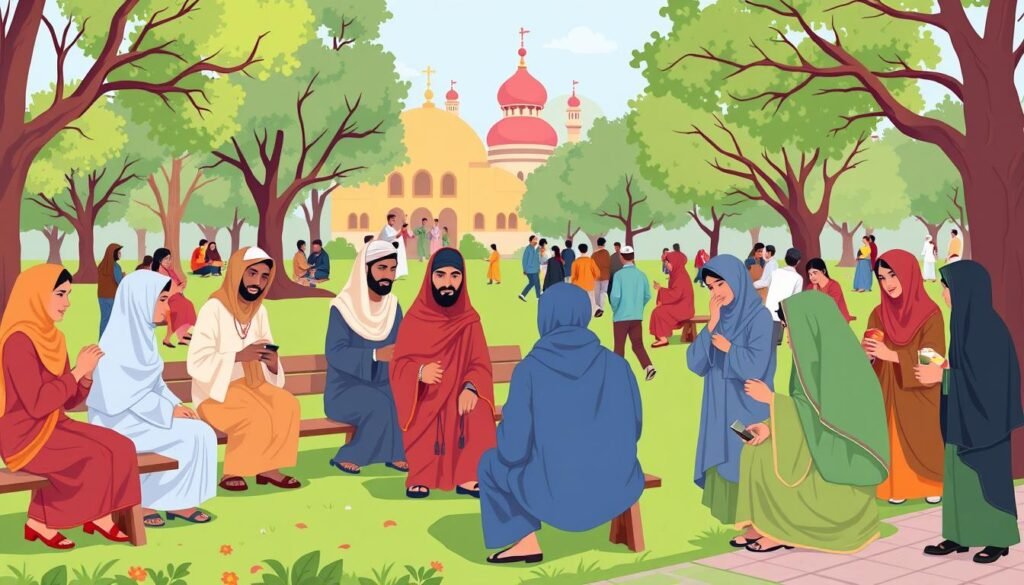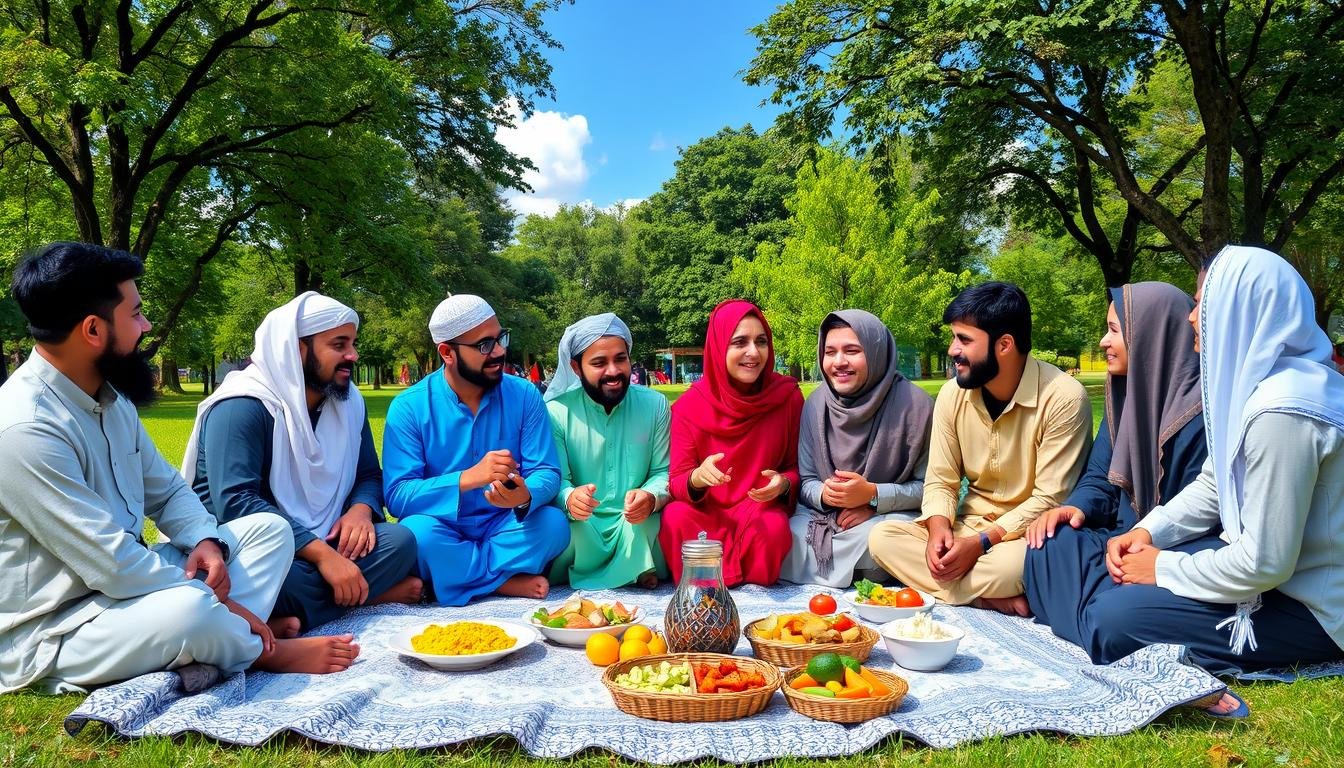In a world often divided by religious differences, can Muslims and Christians be friends? This question makes us think about the possibility of real friendships across faiths. It’s about finding common ground, respect, and shared beliefs.
Both Muslims and Christians deeply believe in their faiths. This makes us wonder: can these beliefs bring us together instead of apart? As we explore this, we’ll look at understanding faith, key principles in religious texts, and community efforts to build connections.
Understanding the Foundations of Faith
Christian beliefs and Islamic beliefs are at the heart of many lives. They shape who we are and how we see the world. Jesus Christ is very important in Islam, mentioned in the Qur’an twenty-five times. This shows his key role in Islamic teachings.
The Qur’an also talks about prophets like Noah, Abraham, Moses, and David. It shows that faith has always been connected. This connection is vital for understanding each other better.
Islam is all about believing in one God, just like Christianity. Both faiths teach us to love and care for others. This is shown in the Gospel of Mark, where loving God and others is key.
Islam has different groups, like Sunnites and Shiites. This is similar to the many Christian denominations. It shows that faith can be complex and varied.
Christians believe in Jesus Christ’s sacrifice for us. They say faith is the most important thing. Muslims, on the other hand, believe in following the Koran and doing good deeds to find forgiveness.
Both faiths believe in life after death. Muslims dream of paradise, while Christians look forward to Jesus Christ’s return. This shared belief can bring us closer together.
Many people want to talk and be friends, despite our differences. Changing faiths can be tough, so we need patience and respect. Knowing these things helps us have better conversations and work together.
The Commonalities Between Christians and Muslims
Christians and Muslims share many important things that help them understand each other. These commonalities are like a bridge for talking and becoming friends. The commitment to faith is a big thing they both have. It helps them talk and learn from each other.
Profound Commitment to Faith
Both Christianity and Islam ask for a lot of faith from their followers. They have things like prayer, fasting, and charity. These help people get closer to God.
Both faiths see these activities as very important. They make people feel connected to each other’s beliefs.
Shared Family Values
Family is very important in both faiths. Christians and Muslims see family as the base of society. They value love, respect, and support in families.
This makes it easier for families from both faiths to understand each other. They can work together on community projects.
Diverse Approaches to Faith Practice
There’s a lot of variety in how Christians and Muslims practice their faith. They have different rituals and holidays. This diversity in faith practice lets people share their beliefs.
It also lets them learn from each other. People interested in this topic can read more here: key relationship dynamic.
Exploring the Concept of Friendship in Islam
In Islam, friends show respect and care for each other. They help each other in good times and bad. This kind of friendship builds strong bonds and kindness.
It’s not just for Muslims. It helps people of all faiths come together. This makes the world a better place.
When we talk about friends from different backgrounds, empathy and teamwork are key. Working together in the U.S. shows how friendships can grow. For example, a church and a group helped kids at Abbey Lane Apartments.
Children got help from many mentors. This shows how education and friendship can cross religious lines.
Islamic friendship aims to build bridges between Christians and Muslims. A book called “Christian. Muslim. Friend” shows how to do this. It teaches respect and understanding, helping both sides to find common ground.
Religious Texts on Interfaith Relationships
Exploring interfaith relationships shows how important it is to respect and be kind to each other. Religious texts guide us in these interactions. The Quran has verses that teach us to be kind to those who believe differently.
Quranic Guidance on Kindness towards Non-Muslims
The Quran tells us how to treat people of other faiths. It says to be respectful and compassionate, as in Quran 60:8 and 60:9. This teaching is about fairness and treating everyone equally.
Being kind to non-Muslims helps us build strong relationships. It shows we value respect, no matter our beliefs.
Interpretation of Key Verses
Understanding the Quran means looking at its verses carefully. The call for kindness is more than just tolerating others. It’s about living by values that everyone can agree on.
The Quran teaches us to respect all people. This helps us make friends across faiths. Reading these texts shows us how to connect with others, based on our shared humanity.

Can Muslims And Christians Be Friends?
Can Muslims and Christians be friends? It’s all about understanding each other’s beliefs and practices. Mutual respect and cultural understanding are key. Talking about what we share, not what we disagree on, makes for better friendships.
Muslims often don’t eat alcohol or pork. When you get to know them, it’s nice to offer food they can eat. Talking about family, likes, and challenges in the West helps us understand each other better.
Sharing stories from the Bible or the Quran can bring us closer. Asking how you can pray for them shows you care. It opens up new ways to talk and connect.
Building a strong friendship between Muslims and Christians starts with good intentions. Being honest about who you are helps build trust. It’s better to share love than to argue about beliefs. Respect and understanding are the foundation of lasting friendships.
Building Bridges: Ways to Foster Friendships
Starting friendships between Muslims and Christians is easy with the right steps. We need to talk and respect each other. Talking about faith lets us share and learn from each other.
Starting Conversations about Faith
Talking about faith can be very rewarding. Being curious and respectful helps us understand each other better. We find common ground like caring for others and wanting justice.
Practicing Hospitality with Respect
Being kind to each other builds strong friendships. It’s important to respect each other’s traditions. Sharing meals or celebrating holidays together helps us connect.
Engaging in Community Activities Together
Working together in the community strengthens our bonds. Helping out at charities or joining interfaith events is great. It shows we care about the same things and want to make the world better.
Challenges Faced in Interfaith Friendships
Starting interfaith friendships can be hard. Misinformation leads to wrong ideas about Muslims and Christians. Many people have stereotypes that are not true.
This makes it hard to really connect with others. We need to talk about these wrong ideas to understand each other better.
Christian history also adds to the problem. It has looked down on friendships with others because of old ideas. This old thinking still affects how we see interfaith friendships today.
Politics also make things harder. Foreign relations issues can make it tough to build friendships based on respect. It’s important to know about these problems to make interfaith friendships work.
To overcome these issues, we need to talk openly and with respect. By understanding each other’s views and being kind, we can build strong friendships between Muslims and Christians. This is true even when we face challenges.
The Role of Community in Shaping Perceptions
Communities shape how we see different faiths. They affect how we view Islam and Christianity. Community perception comes from how people interact with each other.
Groups that work for unity help a lot. They make it easier for people to talk and learn from each other. This way, communities can become more accepting.

When people work together, like in charity or cultural events, it helps a lot. Seeing people get along changes how we see things. It makes us more open to different cultures.
Communities play a huge role in how we get along with each other. By working together and sharing experiences, we can overcome bad views. This leads to a better world for everyone.
Examples of Successful Muslim-Christian Friendships
Muslim and Christian families have formed strong bonds. These friendships grow in local communities. They show how respect and shared experiences can last a lifetime.
Case studies show the good effects of interfaith work. They help people understand and work together better.
Case Studies from Local Communities
In Bryn Mawr, Pennsylvania, two boys from different faiths became friends early on. Their friendship has lasted as they grew up. Now, they go to different schools but still stay close.
Their families also support their friendship. They share meals, celebrate together, and welcome each other into their homes. This shows how important community is in keeping these friendships strong.
Prominent Interfaith Initiatives
Many interfaith programs help people talk and understand each other better. These efforts bring communities together. They focus on values like love, acceptance, and helping others.
These programs lead to joint activities that strengthen friendships. They show that interfaith friendships can bring hope in a world divided by religion. They help break stereotypes and bring people together.
Respecting Cultural and Religious Differences
It’s key to understand and respect cultural differences between Christians and Muslims. Both faiths have their own traditions and beliefs. This makes our world richer and more interesting.
Knowing about religious differences helps us talk better and get along. It lets us see each other with kindness and as fellow humans.
A survey showed many people want to be friends across faiths. 58% of American Muslims have friends who are not Muslim. And 52% of Christians want to be closer to Muslims.
Meeting new people and trying new things helps us learn and grow. Sharing stories and joining in community events can make us appreciate each other more.
Working together on shared goals helps us respect each other more. This makes our communities happier and stronger. Studies show that diverse places are often happier.
The Impact of Media and Society on Interfaith Relations
The media shapes how we see Muslims and Christians. News and shows can make us understand or divide. Sensational stories often focus on fear, not friendship.
In Britain, only 6% are Muslim, but they’re often misunderstood. This makes things worse, especially since 52% are non-religious. But, community efforts and gatherings can help.
Interfaith groups push for talking and working together. After 9/11, the U.S. and U.K. started deeper faith talks. Now, groups focus on learning from each other.
In Lebanon, media affects how different groups get along. With eighteen sects and history of conflict, media can highlight crises. But, projects show Muslims and Christians can work together.
The media can either hurt or help how we see each other. By sharing stories of working together, we can change. This can make us respect and understand each other more.
Future Prospects for Interfaith Friendships
The future of interfaith friendships looks bright, especially between Muslims and Christians. In the United States, many groups are working together. They focus on shared values and understanding each other better.
Studies in Norway show that some Christians wanted to convert their Muslim friends. But many realized keeping true friendships was more important. They learned that respecting each other’s beliefs is key.
People say it’s important to talk with respect and build strong relationships. The efforts to foster interfaith cooperation are helping. Now, they focus on celebrating what they have in common and working together.
Looking ahead, there are plans for more talks between different faiths. The U.S. Conference of Catholic Bishops and Muslim groups are leading these efforts. They aim to bring people together for peace and to solve problems.
FAQ
What are the core beliefs of Christianity and Islam that can facilitate friendship?
Christianity and Islam both teach love and respect for others. They value family and community. These values help build friendships based on shared morals.
How can Muslims and Christians understand each other better?
Talking openly about faith helps. Joining community events and learning about each other’s cultures is also key. This builds respect and empathy.
What does friendship mean in Islam?
In Islam, friendship means being kind and supportive. It’s about respecting each other while following Islamic teachings. This helps in building good relationships with Christians.
Are there specific Quranic verses that address interfaith relationships?
Yes, Quran 60:8 and 60:9 talk about treating others kindly. They call for justice towards all faiths, including Christians.
How can Muslims and Christians build meaningful friendships?
Start by talking about faith in a respectful way. Be hospitable and understand each other’s food rules. Joining in community activities helps too.
What challenges do interfaith friendships face?
Societal misconceptions and cultural misunderstandings are big challenges. Adverse media can also hurt relationships. Knowing these barriers helps build real friendships.
What role do communities play in shaping perceptions of Islam and Christianity?
Communities shape how we see Islam and Christianity. By promoting positive interactions, they help build unity and respect for all beliefs.
Can you provide examples of successful Muslim-Christian friendships?
Yes, many places have shown how Muslim-Christian friendships can work. These stories show how respect and working together can create strong bonds.
Why is it important to respect cultural and religious differences in interfaith relationships?
Respecting differences is key to building strong friendships. It helps us understand and empathize with each other, making our relationships better.
How can media representations affect interfaith relationships?
Media can either help or hurt our relationships. By looking at how Muslims and Christians are shown, we can work to change negative images and promote understanding.
What are the future prospects for Muslim-Christian friendships?
The future looks bright for Muslim-Christian friendships. More dialogue and community efforts will help us understand and work together better, building stronger bonds.

Rockin’ the faith, one verse at a time!
Growing up, the Bible’s stories deeply impacted me. Now, with over 15 years of preaching experience, I blend timeless teachings with modern technology, making them relevant for today’s world.
Bible Hub Verse is my platform to share historical insights and thought-provoking articles, exploring both familiar and uncommon Christian topics. My passion is building a welcoming online space for everyone to learn, grow in their faith, and discover the Bible’s enduring message.
Join the journey!
God bless you.









